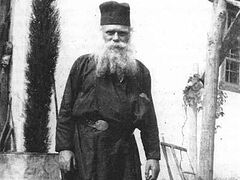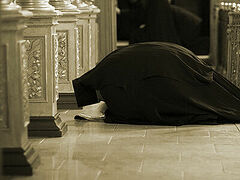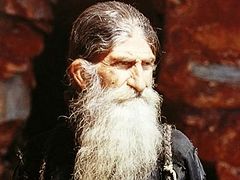 The Icon of the Most Holy Theotokos at Iveron Monastery —Where else did you serve here on the Holy Mountain?
The Icon of the Most Holy Theotokos at Iveron Monastery —Where else did you serve here on the Holy Mountain?
—The former abbot of Pantokratoros Monastery, Fr. Athanasios, invited me, and I went to his monastery. There he made me a deacon, priest and archimandrite. I served there as a priest on duty for many years. And as a deacon, I served for some time in Esphigmenou Monastery. Abbot Athanasios and the fathers had been very good before the monastery fell into the Zealot delusion. A certain Ephraim came there and messed up their minds, so they stopped commemorating our Patriarch Bartholomew.
At Pantokratoros Monastery, which was then idiorhythmic, I served as a priest for five years. Then they demanded that I go as a priest on duty to the chapel of the Panagia Portaitissa at Iveron Monastery where I served for another eleven years. And then, also as a priest on duty and father-confessor, I struggled at Xenophontos Monastery for twenty-five years, and at Constamonite Monastery, and then at Simonopetra Monastery. There at Simonopetra Monastery at the time was no abbot, nor anyone else. As a priest and a chanter, I helped Fr. Neophytos for four or five years.
—We noticed that you are very fond of our Grigoriou Monastery!
—I have been coming here ever since I was a deacon. Pantokratoros Monastery sent me as its representative for the feasts of Grigoriou Monastery. Since then, I have loved St. Nicholas and the monastery fathers. Then the abbot was Fr. Athanasios, full of abstinence and meekness. He was a holy man. Even King George II of Greece1 came here and confessed his sins to him. Fr. Athanasios had such spiritual wisdom, even though he was poorly educated! Just remembering him is enough for me to awaken spiritual feelings in my heart. The current abbot, Fr. George, tells me that he loves me. I too tell him that I love him because we are brothers in Christ and one family. What hatred can there be between us?
—Do you remember any miracle that occurred through the icon of the Panagia Portaitissa when you served there?
—Yes, of course! Once there was a severe drought. The Holy Kinot sent out a letter to all the monasteries asking for litanies and prayers. I celebrated them at the Chapel of the Panagia Portaitissa of Iveron Monastery. We also went out to the litany with the Panagia Portaitissa icon, and as soon as we started praying, clouds appeared and gradually gathered above us, and rain began to pour down. And later, in 1991, when there was a big fire on the Holy Mountain, Iveron Monastery was asked for this icon of the Mother of God to be taken out and put in front of the flame, but the Iveron monks refused. Well, what can be said here?
—Did you know any other local monks who were virtuous in spiritual life?
—The old fathers were very good. Now monastic life has cooled down everywhere because monasteries and monks no longer observe the rules. Don’t you see? Not a drop of rain has fallen for so many months! Fathers arrange cross processions in Karyes, but it does not rain. And how does the Mother of God still endure us? She is not waiting for anything but our repentance! Can’t you see how many earthquakes there are around? Eight-point, nine-point earthquakes—everyone is horrified, and still no one repents! It’s the wrath of God! And the rising of prices around the world is nothing more than a consequence of sins.
—And what will become of us, father?
—We will be on the left hand of the Lord. But the Most Good God and His Mother are still waiting, waiting, waiting... Even those in Hell are waiting because their condition is not final (just like those who are in Paradise). Everyone is waiting for the Great Judge to come at His Second Coming in order to judge the whole world and put everyone in their place. And when? He alone knows! God is waiting for our repentance until a certain point when He will shake the whole earth and call everyone to Judgment.
When you come to court, the prosecutor tells you, “It is not I who accuse you, but such-and-such an article does.” Isn’t it so? It’s the same with God! The words that He left us are what will judge us—whether or not we acted according to them. The holy Evangelist John also says: In My Father’s house are many mansions (Jn. 14:2). The “mansions” are some kind of spiritual dwellings; however, in hell, Father Damascene, there are several levels and “hells” too. So let’s repent as long as there is light, as long as we have daylight. Because when night falls, what work can you do? God gives us night as an image of hell, and day as an image of Paradise. This is what many historians say.
Let us each make out the good in ourselves and walk in that which is “on the right.” This life, Father Damascene, is the forerunner of another life—great, eternal and never-ending. Let’s get ready for that life here by our monastic life. Christians in the world should also prepare themselves, but we especially should, who are obliged to fulfill the vows of our angelic schema. Just imagine: when an old monk, still worse a hieromonk, throws off his robe and marries, tell me what punishment can await him? He has thrown aside the love of God decided to love a woman.
I don’t blame or judge anyone, but I must tell the truth. The priest personifies and represents God, which means that his unworthy deeds humiliate God. Tell me where will his soul go after he dies? God keeps waiting for him, but the man has ceased to believe and fear God!
Have you seen the prodigal son? He said to his father: Father, give me the portion of goods that falleth to me (Lk. 15:12). When hunger and hardship came upon him, he got to the point where he ate the husks given to pigs. And when he returned, others were indignant. However, the father told him: “My child, come here—you are mine too!” The other son got angry: Lo, these many years do I serve thee, neither transgressed I at any time thy commandment: and yet thou never gavest me a kid (Lk. 15:29). “My children,” the father said. “All that I have is yours. It is meet that we should eat and drink now.” And then they all paid tribute to the father who showed such great love even for the prodigal son.
—And what can you tell us about the antichrist, father?
—Who is he? And what does he want here? Oh, the one who multiplies iniquity, my child—and therefore the Second Coming of our Lord is approaching. The Lord will say two things when He comes: Depart from Me, ye that work iniquity (Mt. 7:23); and, Come, ye blessed of My Father (Mt. 25:34). As smoke vanishes in the air, so will the wicked and workers of iniquity flee from the face of God. Greece is a holy country. You can see saints, relics, martyrs, monasteries, monks and nuns laboring everywhere. However, sin has multiplied in the world, and all this is despised by worldly people, so that it is no longer possible to help them. This is why our country is suffering. And the clergy have grown cold from the attacks of the devil. It no longer supports the people from the very foundations in their faith in God.
What does our Great Mother, the Queen of Heaven, say now? What does She say? She will appear before the Throne of the Judge just when Her Son will be judging the whole world; and She has the right, the authority received from Her Son, to grant forgiveness. And She Herself can change the verdict of the Judgment as She wishes. Therefore, whoever has great love for Her, venerates Her here, loves Her and believes in Her help, will receive help from the Most Holy Theotokos.
So let us learn the Akathist to the Annunciation, where one of the verses reads, “Rejoice, supplication before the Righteous Judge: Rejoice, forgiveness of many sins!” (ikos 7). So let us put all our trust in Her here, on the Holy Mountain! Let us love the Garden of the Mother of God, so She can look at us with Her meek and intercessory gaze at the Last Judgment. God is merciful. We are in His Mother’s garden. His Mother has authority, but She is waiting for our repentance.
Read carefully Canon 1 of St. Nicodemus, Tone 1, from the Book of Hymns to the Mother of God. There, the Mother of God implores Her Son to save us, but the Lord answers Her, “Unless they repent no one will be saved.” There is no respecting of persons here. Do you get it, father?
—We know that you are also a good chanter!
—Yes, thank God! Nothing is mine. I have already said that all good things are from God—all good and grace-filled gifts.
—Please sing to us the prayer, “It is truly meet…”
—Don’t ask me, father. Can’t you see what state I am in? My liver is enlarged, I eat only leftovers and can’t sing anymore. I often gasp for air. I want to sing, but I have no more energy. That’s why I drink a little wine to strengthen myself. Before getting sick, I sang always and everywhere. I sang canons to the Mother of God at Vigils, on Pascha and here. But what can I do now? I’m weak! I go to my room, and since I can’t stand at church services I pray with my prayer rope. I’ve gone through many difficulties in my life, and now I have come to the end. I’m waiting...
—Give us advice before you depart this life, Father Stefanos!
—What advice do you want from me? I don’t understand! You who go to Albania, Congo and preach everywhere… Don’t you give people advice?
—Well, then one more question! What should we pay attention to in our monastic life?
—Let’s work on keeping our monastic vows, which we took in front of the holy altar! Nothing more! This will be required of us by the Most Good God and the Mother of God. We promised! Didn’t we promise? So let’s do good and God-pleasing deeds for the life to come. How else can we acquire the life to come? And what is the life to come like? It’s God Himself! This is what John the Evangelist says: He that believeth on the Son hath everlasting life (Jn. 3:36); And this is life eternal, that they might know Thee the only true God, and Jesus Christ, Whom Thou hast sent (Jn. 17:3).
So, let’s perform the works of our monastic life: patience and obedience; for obedience is performed for the sake of God and ascends to God, just as Christ as a Man became obedient even to death. First He was obedient to Joseph and His Mother, and then He was obedient to the will of the Father and suffered death on the Cross.
—Pray for us too, Father Stefanos!
—And you for me too!
—Bless us!
—Go with peace, father. Thank you, thank you!
—Good Paradise to us!
***
That was a wonderful conversation I had with Fr. Stefanos in April 1997. He stayed in our monastery for six months. In the autumn he went to the Russikon [St. Panteleimon’s Monastery.—Trans.] where he was given a cell overlooking the sea. Before leaving, he told us:
“Fathers, I will not come to Grigoriou Monastery again! Many thanks to St. Nicholas and all of you! I thank your abbot, Father George, and all the brotherhood.”
“Why won’t you come again, Fr. Stefanos?”
“Very soon I will depart for another world. Yes, of course, they are waiting for me up there. I have already received a call...”
Indeed, in the spring of 1998, we learned that our beloved and dear Fr. Stefanos had passed away to meet with the Mother of God and Her Son, to receive a reward for his labors and join the host of the venerable Athonite fathers. Eternal memory to him, and may his prayers be with us.2




